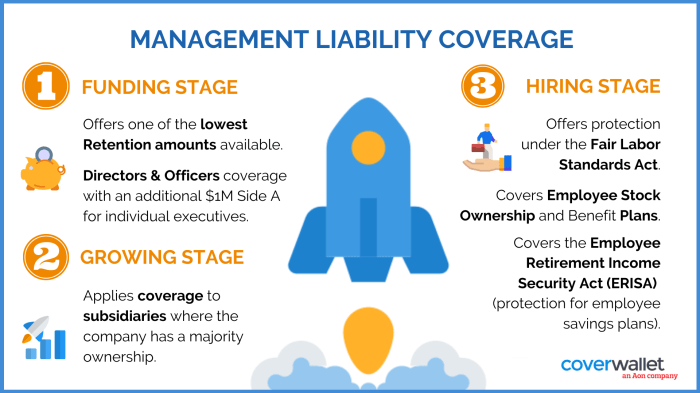Exploring the realm of Low-Cost Liability Coverage for Startups, this introduction sets the stage for a deep dive into the importance and nuances of liability coverage for new businesses. It's a critical aspect that can make or break a startup's success, making it essential to understand the ins and outs of this topic.
As we delve further, we'll uncover key factors that influence costs, different types of coverage available, and tips for finding affordable options to safeguard your startup.
Understanding Low-Cost Liability Coverage

Low-cost liability coverage refers to insurance policies that offer protection to startups at an affordable rate against claims of negligence or harm caused to others. It is designed to help mitigate financial risks associated with potential lawsuits, damages, or legal expenses that may arise during the course of business operations.
Importance of Low-Cost Liability Coverage for Startups
Startups, being in their early stages of development, often have limited resources and are more vulnerable to financial setbacks. Having low-cost liability coverage is crucial for startups as it provides a safety net against unforeseen circumstances that could potentially bankrupt the business.
- General Liability Insurance: Protects against claims of bodily injury, property damage, and advertising injury.
- Professional Liability Insurance: Covers claims of negligence or errors in services provided.
- Product Liability Insurance: Shields against claims related to defective products that cause harm or injury.
Having adequate liability coverage in place can help startups build trust with clients, investors, and partners, as it demonstrates a commitment to responsible business practices.
Benefits of Having Adequate Liability Coverage
Startups with proper liability coverage can focus on business growth and innovation without the constant fear of potential legal liabilities. It provides a sense of security and peace of mind, allowing entrepreneurs to navigate challenges with confidence and protect their hard-earned assets.
- Financial Protection: Safeguards the business against costly lawsuits and settlements.
- Legal Support: Offers access to legal assistance and resources in case of disputes or claims.
- Reputation Management: Helps maintain a positive reputation by addressing liabilities promptly and professionally.
Factors Influencing Cost
When it comes to the cost of liability coverage for startups, there are several factors that come into play. Understanding these factors can help businesses make informed decisions when it comes to protecting themselves financially.
Business Size and Nature
The size and nature of a startup can have a significant impact on the cost of liability coverage. A larger business with more employees and higher revenue may face higher risks, leading to higher premiums for coverage. Additionally, the nature of the business, such as the industry it operates in and the potential risks associated with its operations, can also influence the cost of coverage.
Location of the Startup
The location of a startup can also affect the cost of liability coverage. Startups located in areas prone to natural disasters or with higher crime rates may face higher premiums due to increased risks. On the other hand, businesses situated in low-risk areas may be able to secure coverage at lower costs.
Cost-Saving Strategies
There are several strategies that startups can implement to save on the cost of liability coverage. One approach is to bundle different types of insurance policies together with the same provider, which can often lead to discounts. Another strategy is to implement risk management practices to reduce the likelihood of claims, which can help lower premiums over time.
Additionally, comparing quotes from multiple insurance providers can help startups find the most cost-effective coverage options for their specific needs.
Types of Liability Coverage
Starting a business comes with risks, and having the right liability coverage is crucial for protecting your startup. Let's explore the different types of liability coverage suitable for startups
General Liability Insurance vs. Professional Liability Insurance
General liability insurance and professional liability insurance are two common types of coverage that offer protection for different aspects of your business.
- General liability insurance typically covers claims related to bodily injury, property damage, and advertising injury. It helps protect your business from lawsuits and financial losses resulting from accidents that occur on your property or due to your business operations.
- Professional liability insurance, also known as errors and omissions insurance, is more focused on protecting your business from claims of negligence, errors, or omissions in the services you provide. This type of coverage is especially important for startups in professional service industries, such as consulting or design.
Importance of Product Liability Insurance for Startups
Product liability insurance is essential for startups that manufacture or sell products. This type of coverage protects your business from liability claims arising from injuries or damages caused by your products. In today's litigious society, even the most well-designed products can lead to lawsuits, making product liability insurance a must-have for startups in the manufacturing or retail industry.
Umbrella Insurance and Additional Liability Coverage
Umbrella insurance provides an extra layer of liability coverage beyond the limits of your other policies. It kicks in when the liability limits of your primary policies, such as general liability or auto liability insurance, have been exhausted. For startups looking for added protection against catastrophic events or high-dollar lawsuits, umbrella insurance can be a cost-effective solution to enhance overall liability coverage.
Finding Affordable Coverage
Finding affordable liability coverage is crucial for startups looking to protect themselves from potential risks without breaking the bank. Here are some tips to help startups find cost-effective coverage and save money in the process.
Working with Insurance Brokers or Agents
Insurance brokers or agents can be valuable resources for startups seeking affordable liability coverage. These professionals have access to multiple insurance providers and can help startups compare different policies to find the best coverage at the lowest cost. By working with an insurance broker or agent, startups can save time and effort while still getting the coverage they need.
Bundling Insurance Policies
Bundling insurance policies is another way startups can reduce costs. By purchasing multiple insurance policies from the same provider, startups can often qualify for discounts or lower rates. For example, bundling general liability insurance with property insurance or workers' compensation coverage can result in overall cost savings for startups.
Leveraging Technology for Comparing Coverage Options
Startups can also leverage technology to compare coverage options and costs easily. Many online platforms and tools allow startups to input their information and receive quotes from multiple insurance providers simultaneously. By using these tools, startups can quickly compare different policies, coverage limits, and costs to make an informed decision on their liability coverage.
Final Review

In conclusion, Low-Cost Liability Coverage for Startups is not just a safety net; it's a strategic investment in the longevity of your business. By understanding the various aspects discussed, startups can navigate the complex world of liability coverage with confidence and foresight.
Top FAQs
What factors impact the cost of liability coverage for startups?
The size and nature of the business, along with its location, can significantly influence the cost of liability coverage. Additionally, the level of coverage and the chosen insurance provider play a role in determining costs.
How can startups find affordable liability coverage?
Startups can explore cost-saving strategies such as working with insurance brokers, bundling insurance policies, and leveraging technology to compare coverage options. These approaches can help in obtaining affordable liability coverage without compromising on necessary protection.
What types of liability coverage are suitable for startups?
Startups can benefit from general liability insurance, professional liability insurance, product liability insurance, and umbrella insurance to ensure comprehensive coverage against potential risks and liabilities.




